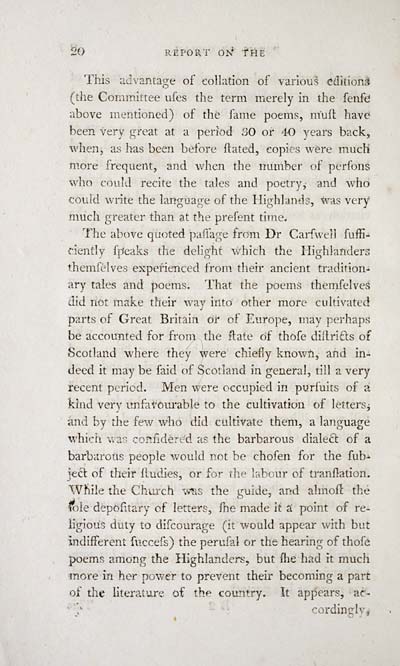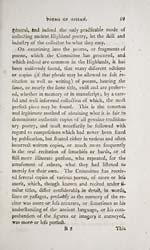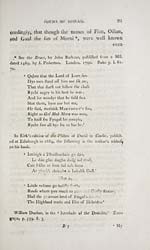Ossian Collection > Report of the Committee of the Highland Society of Scotland, appointed to inquire into the nature and authenticity of the poems of Ossian
(36)
Download files
Complete book:
Individual page:
Thumbnail gallery: Grid view | List view

50 REPORT ON* tHE
This advantage of collation of various ddition.i
(the Committee ufes the term merely in the fenfe!
above mentioned) of the fiime poems, mufl have
been very great at a period .'JO or 40 years back,
whenj as has been before flated, copies were mucH
more frequent, and v/hen the number of perfons
who could recite the tales and poetry, and who
could write the language of the Highlands, ^vas very
much greater than at the prefent time.
The above quoted palTage from Dr Carfwell fuffi-
fiently fp'eaks the delight which the Highlanderc
themfelves experienced from their ancient tradition-
ary tales and poems. That the poems themfelves
did not make their way into other more cultivated
parts of Great Britain or of Europe, may perhaps
be accounted for from the ftate of thofe diitrifts of
Scotland where they Vere chiefly knowù, and in-
deed it may be faid of Scotland in general, till a very
recent period. Men were occupied in purfuits of a
kind very unfavourable to the cultivation of lettersj
and by the few who did cultivate them, a language
which war, colifidère'd as the barbarous diale£t of a
barbarous people would not be chofen for the fub-
jedt of their liudies, or for the labour of tranflation.
While the Church wss the guide, and almofl the
TOÌe depofitary of letters, fhe made it ai point of re-
ligious duty to difcourage (it would appear with but
indifferent fuccefs) the perufal or the hearing of thofe
poems among the Highlanders, but fhe had it much
more in her power to prevent their becoming a part
of the literature of the country. It appears, ac-
cordinglv.
This advantage of collation of various ddition.i
(the Committee ufes the term merely in the fenfe!
above mentioned) of the fiime poems, mufl have
been very great at a period .'JO or 40 years back,
whenj as has been before flated, copies were mucH
more frequent, and v/hen the number of perfons
who could recite the tales and poetry, and who
could write the language of the Highlands, ^vas very
much greater than at the prefent time.
The above quoted palTage from Dr Carfwell fuffi-
fiently fp'eaks the delight which the Highlanderc
themfelves experienced from their ancient tradition-
ary tales and poems. That the poems themfelves
did not make their way into other more cultivated
parts of Great Britain or of Europe, may perhaps
be accounted for from the ftate of thofe diitrifts of
Scotland where they Vere chiefly knowù, and in-
deed it may be faid of Scotland in general, till a very
recent period. Men were occupied in purfuits of a
kind very unfavourable to the cultivation of lettersj
and by the few who did cultivate them, a language
which war, colifidère'd as the barbarous diale£t of a
barbarous people would not be chofen for the fub-
jedt of their liudies, or for the labour of tranflation.
While the Church wss the guide, and almofl the
TOÌe depofitary of letters, fhe made it ai point of re-
ligious duty to difcourage (it would appear with but
indifferent fuccefs) the perufal or the hearing of thofe
poems among the Highlanders, but fhe had it much
more in her power to prevent their becoming a part
of the literature of the country. It appears, ac-
cordinglv.
Set display mode to: Large image | Transcription
Images and transcriptions on this page, including medium image downloads, may be used under the Creative Commons Attribution 4.0 International Licence unless otherwise stated. ![]()
| Permanent URL | https://digital.nls.uk/76520433 |
|---|
| Description | Selected books from the Ossian Collection of 327 volumes, originally assembled by J. Norman Methven of Perth. Different editions and translations of James MacPherson's epic poem 'Ossian', some with a map of the 'Kingdom of Connor'. Also secondary material relating to Ossianic poetry and the Ossian controversy. |
|---|
| Description | Selected items from five 'Special and Named Printed Collections'. Includes books in Gaelic and other Celtic languages, works about the Gaels, their languages, literature, culture and history. |
|---|

